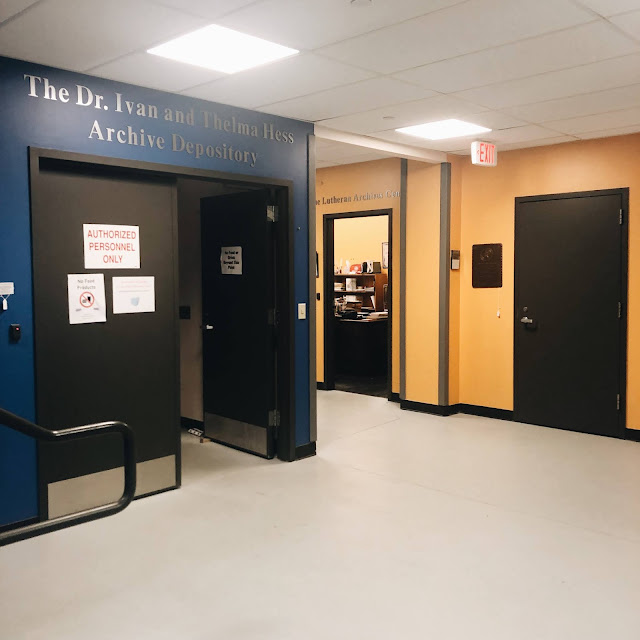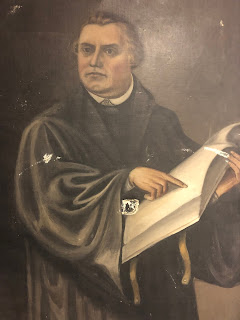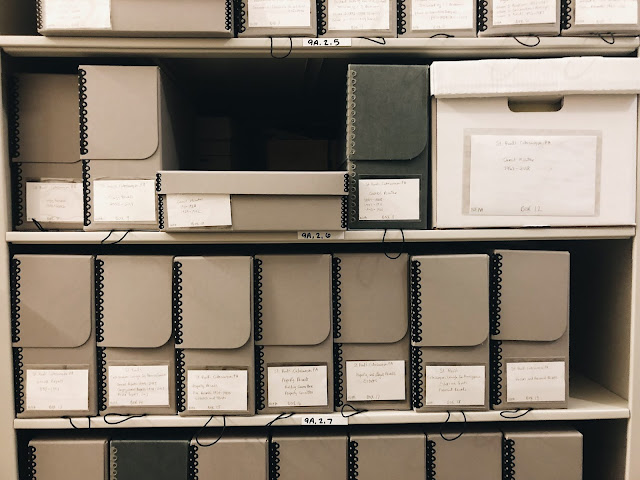If you are curious what we do here at the Lutheran Archives Center at Philadelphia, you're in the right place! In this blog post we're going to share about what we do, who we serve, the types of records you can find in our collections. Keep reading to learn more.
 |
| The Ministerium of Pennsylvania Collection |
History & Mission
The Lutheran Archives Center at Philadelphia (LACAP) is the Northeast Regional Archives (Region 7) for the Evangelical Lutheran Church in America (ELCA). We are part of a network of nine regional archives and a national level (churchwide) archives within the ELCA. Our service area is from southeastern Pennsylvania to Maine, including the synods of Southeastern Pennsylvania, Northeastern Pennsylvania, New Jersey, Upstate New York, Metropolitan New York City, and New England, as well as the non-geographical Slovak-Zion Synod. The Archives was established in 1792 by the Evangelical Lutheran Ministerium of Pennsylvania and Adjacent States; it was officially incorporated in 1979 as an independent 501(c)3 non-profit organization.
Our mission is to document and preserve the history of Lutheranism in the Northeast; provide a secure yet accessible repository of historical records for the synods, congregations, and agencies of ELCA Region 7; and offer archival, educational, and interpretive services.
Our Services
Since 1889, the Archives has been located on the campus of the Philadelphia Seminary; it is
presently located on the lower level of the Brossman Learning Center at the
United LutheranSeminary. This space includes a large vault with high-density compact shelving, a reference
library and workspace for researchers, and an office. Visit www.lacphila.org to learn more. The
Archives is open to researchers by advance appointment only; there is a $10 daily research fee
per person. We also offer long-distance genealogy research services for $35/hour. Currently we are closed to researchers and only provide long-distance research services.
Our Collections
Congregation Records
We hold records from two groups of congregations in its service area: those which have closed; and those which are active and have chosen to deposit their records, or copies thereof, in the archives for more efficient access by researchers. The vast majority of Lutheran congregations maintain their own records and researchers must contact the congregations directly for information. The organizational records of a congregation, including minutes and reports, legal documents, photos, etc., are most useful for congregations and local historians.
The parish registers of congregations contain, in chronological sequence, the records of pastoral acts performed by the pastors of the congregation (baptisms, marriages, funerals, confirmations). These records are useful for individuals, family historians and genealogists. Very few of these records have been indexed, however, and many of the 18th and 19th century registers are written in German. Researchers are welcome to use these records for research. We can provide information regarding records we hold, and information on how to contact congregations.
 |
| 19th century parish register of German Evangelical (Mulberry Street) Lutheran Church, Newark, NJ. |
Personal Papers
We hold a large number of collections of personal papers of Lutheran clergy, theologians and church workers. Examples include: from the 18th century, Henry Melchior Muhlenberg and Justus Henry Christian Helmuth; from the 19th century, Charles Porterfield Krauth, William Julius Mann and Beale Melancthon Schmucker; and from the 20th century, Henry Eyster Jacobs, Sr., Charles Michael Jacobs, Jr., O. Frederick Nolde, Theodore G. Tappert, Martin J. Heinecken and John H. P. Reumann. Personal papers are generally most useful to academic researchers studying specific topics in church history or theology.
 |
| Documents from the Rev. Henry Eyster Horn Collection. |
Church Organizations
We hold the archives of the following Lutheran synods and church bodies:
- Evangelical Lutheran Ministerium of Pennsylvania and Adjacent States; 1748-1962
- Eastern Pennsylvania Synod, LCA, 1963-1968
- Southeastern Pennsylvania Synod, LCA and ELCA; 1968-present
- Northeastern Pennsylvania Synod, LCA and ELCA; 1968-present
- New Jersey Synod, ULCA, LCA & ELCA; 1950-present
- Upstate New York Synod, LCA & ELCA; 1966-present
- New England Synod, LCA & ELCA, 1963-present
- Augustana Lutheran Church, New York Conference; 1870-1962
- Augustana Lutheran Church, New England Conference, 1912-1962
- The General Council of the Evangelical Lutheran Church in North America, 1866-1918
- Metropolitan New York Synod, LCA and ELCA, 1966-present
Synod archives document the history of the church organizations and their varied ministries. They are most useful to historians and academic researchers in church history.
Research Library
Our library contains published works to complement your archival research such as:
- Lutheran histories
- Church histories
- Church organization histories
Our library also has the following tools and services:
- Microfilm reader
- Guest computers
- Scanners
- Photocopier
 |
| The research library where visitors can conduct archival research. |
Where We Are Located
We are located in the "Undercroft" of Brossman Learning Center on the Philadelphia campus of United Lutheran Seminary.
 |
| Entrance to Brossman Learning Center from the parking lot. |
 |
| Entrance to Brossman Center from United Lutheran Seminary campus.
|
Upon entering the building you will be greeted by a friendly receptionist who can help direct you if needed. Then you will make your way down to the archives via stairs or elevator.
 |
| We are accessible by elevator or stairs. |
Once you make it to the lower level of Brossman either via elevator or the staircase you are officially at LACAP! Once you arrive the Associate Archivist will be waiting (since you already scheduled an appointment beforehand) to greet you.
Are You Open to Visitors?
We are currently closed to outside researchers due to COVID-19. We are eager to welcome back researchers and guests when it is safe to do so. Remember that we do provide research services where a staff member can conduct research on your behalf. Please contact the archivist for more information.
What is an Archives?
Archives hold unique & unpublished works which you can also think of as primary sources. They are firsthand accounts and can include manuscripts, letters, reports, meeting minutes, photographs, artifacts, video, and electronic records such as digital photos & video and even emails!
Conducting Archival Research
We always recommend contacting the archivist for research assistance and setting up appointments instead of dropping by. Once you get an appointment set up and visit to the archives the archivist will explain everything once you arrive and already have the requested materials pulled and waiting for you to start your research. You may also use a tool called a “finding aid” which is a document containing detailed information about the collection.
Handling Archival Records
It is important to understand that archival records need to be handled with care in order to maintain their long-term preservation. Here are a few things to know when handling records:
- Follow the guidelines provided by a staff member
- No food/drink around materials
- Only use a pencil, no pens!!
- Wash your hands prior to handling any record or object
- Laptops are okay
- Photography is okay (no flash) - be sure to ask the archivist first as you will need to complete a permissions form
- Keep the items in original order in which they were found
- Consult staff when handling fragile items
 |
| Project Archivist, Melissa Bergoffen handling a document from the Ministerium of PA Collection |
Got a Question?
We hope you enjoyed learning more about what we do here at the Lutheran Archives Center. If you have any questions please leave a comment below! Be sure to follow us on
Facebook,
Instagram, and check out our official
website for more information.












Comments
Post a Comment